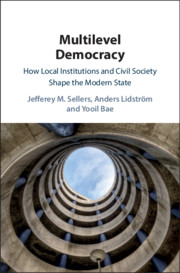Book contents
- Multilevel Democracy
- Multilevel Democracy
- Copyright page
- Epigraph
- Contents
- Figures
- Tables
- Acknowledgements
- Note on the Text
- 1 Introduction
- 2 Multilevel Democracy and the Modern State
- 3 Multilevel Democracies
- 4 Trajectories of Local State Formation
- 5 The Local State and the Formation of Civil Society
- 6 The Policy State and Local Governance
- 7 The Quality of Multilevel Democracy
- Postscript
- Appendix Cluster Analysis of Institutional Indicators
- References
- Index
3 - Multilevel Democracies
A Cross-Sectional Comparison
Published online by Cambridge University Press: 11 February 2020
- Multilevel Democracy
- Multilevel Democracy
- Copyright page
- Epigraph
- Contents
- Figures
- Tables
- Acknowledgements
- Note on the Text
- 1 Introduction
- 2 Multilevel Democracy and the Modern State
- 3 Multilevel Democracies
- 4 Trajectories of Local State Formation
- 5 The Local State and the Formation of Civil Society
- 6 The Policy State and Local Governance
- 7 The Quality of Multilevel Democracy
- Postscript
- Appendix Cluster Analysis of Institutional Indicators
- References
- Index
Summary
In the perspective of multilevel democratic theory, local democracy is fundamental to national democracy. In ways that previous typologies of national democratic institutions have neglected, local institutions and their linkages to governance at higher levels matter for how, as well as how well, democracy works. Alternative models of multilevel democracy depend on distinctive infrastructures of local government and administration, on particular forms of organization in civil society, and on divergent patterns of relations between the state and society at the local as well as the supralocal scale. Logics of infrastructural power, democratic accountability, and contestation foster overarching complementarities among institutions that are usually analyzed separately, from local government and national administration to political parties and organized interests. In countries with a state-dependent local government, hierarchical administration, and restricted incorporation of a local elitist model, civic participation and organization should remain limited. In countries with the independent local government and broad local societal incorporation of the civic localist model, civic organization should be broad based but have limited organizational hierarchies. Where a nationalized infrastructure assigns responsibility for national policy to institutions at the local scale, broad civic and political participation should be incorporated into hierarchical organizations at both the national and the local level.
- Type
- Chapter
- Information
- Multilevel DemocracyHow Local Institutions and Civil Society Shape the Modern State, pp. 48 - 118Publisher: Cambridge University PressPrint publication year: 2020

